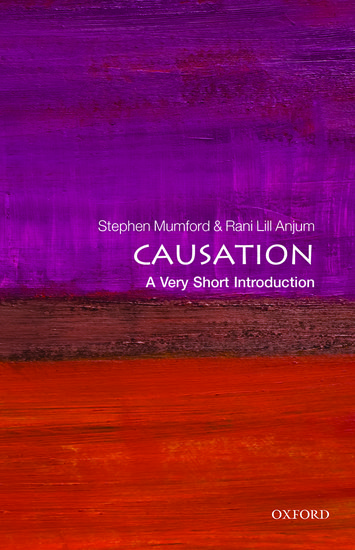Home >
A Very Short Introduction >
Causation (Philosophy)
A Very Short Introduction | Philosophy
Causation
ISBN: 9780199684434
Series: A Very Short Introduction
Causation (Philosophy)
A Very Short Introduction Causation (Philosophy) Media > Books > Non-Fiction > Education Books Expect Delays of Up to 4 Weeks| Order Below |
ISBN
9780199684434 (10-digit ISBN: 019968443X)
- Description
- Key Features
- Series Description
- Table of Contents
- Thought-provoking introduction to a core topic in philosophy
- An engaging introduction to the key theories of causation and the surrounding debates and controversies
- Explores the integral part causation plays in a number of different areas, including physics, biology, law, technology, medicine, and economics
- Explains the key issues through a series of questions relating to the big issues
Causation is the most fundamental connection in the universe. Without it, there would be no science or technology. There would be no moral responsibility either, as none of our thoughts would be connected with our actions and none of our actions with any consequences. Nor would we have a system of law because blame resides only in someone having caused injury or damage. Any intervention we make in the world around us is premised on there being causal connections that are, to a degree, predictable. It is causation that is at the basis of prediction and also explanation. This Very Short Introduction introduces the key theories of causation and also the surrounding debates and controversies. Do causes produce their effects by guaranteeing them? Do causes have to precede their effects? Can causation be reduced to the forces of physics? And are we right to think of causation as one single thing at all?
Oxford's Very Short Introductions series offers concise and original introductions to a wide range of subjects--from Islam to Sociology, Politics to Classics, Literary Theory to History, and Archaeology to the Bible.
Not simply a textbook of definitions, each volume in this series provides trenchant and provocative--yet always balanced and complete--discussions of the central issues in a given discipline or field. Every Very Short Introduction gives a readable evolution of the subject in question, demonstrating how the subject has developed and how it has influenced society. Eventually, the series will encompass every major academic discipline, offering all students an accessible and abundant reference library.
Whatever the area of study that one deems important or appealing, whatever the topic that fascinates the general reader, the Very Short Introductions series has a handy and affordable guide that will likely prove indispensable.
Please note: As this series is not ELT material, these titles are not subject to discount.
Introduction: why causation?
1: The problem, or: what's the matter with causation?
2: Regularity, or: causation without connection?
3: Time and space, or: do causes occur before their effects?
4: Necessity, or: do causes guarantee their effects?
5: Counterfactual dependence, or: do causes make a difference?
6: Physicalism, or: is it all transference?
7: Pluralism, or: is causation many different things?
8: Primitivism, or: is causation the most basic thing?
9: Dispositionalism, or: what tends to be?
10: Finding causes, or: where are they?
A very short afterword
Further reading
Index
Causation is the most fundamental connection in the universe. Without it, there would be no science or technology. There would be no moral responsibility either, as none of our thoughts would be connected with our actions and none of our actions with any consequences. Nor would we have a system of law because blame resides only in someone having caused injury or damage. Any intervention we make in the world around us is premised on there being causal connections that are, to a degree, predictable. It is causation that is at the basis of prediction and also explanation. This Very Short Introduction introduces the key theories of causation and also the surrounding debates and controversies. Do causes produce their effects by guaranteeing them? Do causes have to precede their effects? Can causation be reduced to the forces of physics? And are we right to think of causation as one single thing at all?
Key Features
- Thought-provoking introduction to a core topic in philosophy
- An engaging introduction to the key theories of causation and the surrounding debates and controversies
- Explores the integral part causation plays in a number of different areas, including physics, biology, law, technology, medicine, and economics
- Explains the key issues through a series of questions relating to the big issues
Series Description
Oxford's Very Short Introductions series offers concise and original introductions to a wide range of subjects--from Islam to Sociology, Politics to Classics, Literary Theory to History, and Archaeology to the Bible.
Not simply a textbook of definitions, each volume in this series provides trenchant and provocative--yet always balanced and complete--discussions of the central issues in a given discipline or field. Every Very Short Introduction gives a readable evolution of the subject in question, demonstrating how the subject has developed and how it has influenced society. Eventually, the series will encompass every major academic discipline, offering all students an accessible and abundant reference library.
Whatever the area of study that one deems important or appealing, whatever the topic that fascinates the general reader, the Very Short Introductions series has a handy and affordable guide that will likely prove indispensable.
Please note: As this series is not ELT material, these titles are not subject to discount.
EASY ORDER FORM
PRICES LISTED INCLUDE CONSUMPTION TAX
Price Before Tax:
¥1,790


